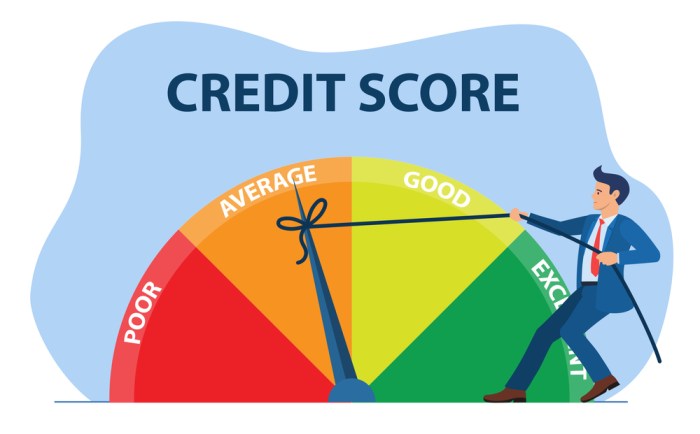With credit score improvement as the focal point, this paragraph delves into the intricacies of enhancing one’s credit score. It sheds light on the importance of financial health, the nuances of credit scores, and effective strategies for improvement.
The subsequent paragraphs will explore the significance of credit score improvement and provide practical tips for boosting your creditworthiness.
Importance of Credit Score Improvement

A good credit score is crucial for maintaining financial health as it reflects an individual’s creditworthiness. Lenders use credit scores to assess the risk of lending money to borrowers, making it vital to have a high credit score.
A higher credit score can lead to better loan terms and lower interest rates. Borrowers with good credit scores are more likely to be approved for loans and credit cards, and they often receive lower interest rates, saving money in the long run.
Impact of Credit Score on Financial Life
- Affects Loan Approval: Lenders are more willing to approve loans for individuals with high credit scores, as they are considered less risky borrowers.
- Lower Interest Rates: Higher credit scores are associated with lower interest rates on loans and credit cards, reducing the overall cost of borrowing.
- Access to More Credit Options: Individuals with good credit scores have access to a wider range of credit options and financial products.
- Insurance Premiums: Some insurance companies use credit scores to determine premiums, with lower scores leading to higher insurance costs.
- Employment Opportunities: Certain employers may check credit scores as part of the hiring process, especially for positions involving financial responsibilities.
Understanding Credit Scores
Credit scores are numerical representations of an individual’s creditworthiness, indicating the likelihood of repaying borrowed money. They are crucial in determining an individual’s access to credit, interest rates, and loan approval.
Calculation of Credit Scores
Credit scores are calculated based on various factors, with the most common being:
- Payment History: This reflects whether payments were made on time or if there were any late or missed payments.
- Credit Utilization: This is the ratio of credit used to the total credit available, with lower utilization ratios generally seen as more favorable.
- Length of Credit History: The longer the credit history, the better, as it provides more data for assessing creditworthiness.
- Types of Credit: Having a mix of credit types, such as credit cards and loans, can positively impact credit scores.
- New Credit: Opening multiple new credit accounts in a short period can negatively affect credit scores.
Different Credit Scoring Models
Major credit bureaus use different credit scoring models to calculate credit scores. The most commonly used models are:
- FICO Score: Developed by the Fair Isaac Corporation, FICO scores range from 300 to 850 and are widely used by lenders to assess credit risk.
- VantageScore: Created collaboratively by the three major credit bureaus (Equifax, Experian, and TransUnion), VantageScore ranges from 300 to 850 and considers factors like payment history and credit utilization.
- TransRisk Score: Developed by TransUnion, the TransRisk Score is a model that ranges from 300 to 850 and evaluates credit risk based on credit history and other factors.
Strategies for Improving Credit Scores
Improving your credit score is essential for accessing better financial opportunities. By following these strategies, you can take control of your credit health and work towards a higher credit score.
Regularly Check and Monitor Your Credit Score
It is crucial to regularly check your credit score to stay informed about your financial standing. You can request a free credit report from the major credit bureaus and monitor any changes or discrepancies that may affect your score.
Reduce Credit Card Balances and Manage Debts Effectively
High credit card balances can negatively impact your credit score. Aim to reduce your balances and keep your credit utilization ratio low. Make timely payments and consider creating a budget to manage your debts effectively.
Build a Positive Payment History and Improve Credit Utilization
Consistently making on-time payments is key to building a positive payment history. Focus on paying your bills on time and in full to demonstrate responsible financial behavior. Additionally, aim to maintain a low credit utilization ratio by using credit wisely and avoiding maxing out your credit cards.
Impact of Credit Score Improvement
Having a higher credit score can significantly increase an individual’s access to various financial opportunities. Lenders, landlords, and even potential employers often use credit scores to assess an individual’s financial responsibility and trustworthiness. A higher credit score can lead to lower interest rates on loans, higher credit limits, better insurance premiums, and even more favorable terms on rental agreements or job offers.
Timeline for Seeing Improvements in Credit Scores
Improving credit scores is not an overnight process and can take time to see significant changes. By implementing strategies such as paying bills on time, reducing credit card balances, and monitoring credit reports for errors, individuals can start to see improvements in their credit scores within a few months. However, to achieve a substantial increase in credit scores, it may take anywhere from six months to a year or longer, depending on the individual’s starting point and the extent of the improvements made.
Real-life Success Stories of Credit Score Improvement
There are numerous real-life success stories of individuals who have successfully improved their credit scores through diligent effort and strategic financial planning. For example, Mary, a single mother, was able to increase her credit score from 580 to 720 within a year by paying off her outstanding debts, disputing errors on her credit report, and using credit responsibly. As a result, Mary was able to qualify for a mortgage at a lower interest rate, saving her thousands of dollars over the life of the loan. These success stories serve as inspiration for others looking to improve their credit scores and achieve their financial goals.
